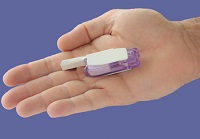 |
| MannKind's Afrezza is delivered through a proprietary inhaler called Dreamboat.--Courtesy of MannKind |
If your office has a pool on Sanofi's Afrezza launch--and come on, why not?--you're already tired of talking about Pfizer's ($PFE) failed version of an inhaled insulin, Exubera. You've entertained dubious comparisons between Afrezza, the needle-free version of a common insulin injection, and FluMist, the needle-free version of a common vaccine. You've made your list of reasons why other diabetes drugmakers aren't rushing around to come up with their own insulin inhalers.
How helpful is any of that to a betting person? What you want is intel on the French drugmaker's plans for the rollout.
One certainty: Sanofi ($SNY) isn't planning to compete on price.
Afrezza's cost will vary patient-by-patient, but a common example--12 insulin units, one inhalation at each meal--puts its wholesale sticker at $7.54 per day. That's high, compared with its injectable rivals. As Reuters points out, it's more than twice the price of Sanofi's own mealtime injectable, Apidra.
 |
| Sanofi's Stefan Schwarz |
To Stefan Schwarz, who heads up the Afrezza brand, comparing the insulin inhaler to its injectable competitors on price--on most things, actually--is "misleading." Afrezza may accomplish the same goals as injectables do, but its appeal is very particular, to two very particular groups of patients, Schwarz figures.
A large group of diabetes patients are taking pills to regulate their blood sugar, but need additional help--from insulin--to keep those numbers under control. About two-thirds of those patients don't want to add insulin to their regimens, according to Nielsen Quantitative Market Research. Almost 40% of them say they don't want to add insulin specifically because they don't like the idea of injections.
"We see Afrezza as a very important treatment option, to get over that barrier of insulin initiation," Schwarz says. A kinder, gentler version, let's say.
And then there are patients who are using a daily, basal insulin--such as Sanofi's blockbuster Lantus--but need mealtime insulin to corral their blood sugar. You'd think that these patients would be over the idea of injectable insulin, but many of them aren't, Schwarz says. Some say they don't want to add more injections every day. Others are fine with injecting their insulin at home, but mealtimes aren't always at home, and they don't want to inject themselves in public. The Afrezza device is "very very small," Schwarz points out--unlike the much maligned Exubera device, which was compared at the time to a can of Pringles potato chips--and thus very portable. Plus, plenty of people use other types of inhalers in public places.
Second: Patients won't be paying the difference. In fact, they could save some money.
Just check Afrezza's U.S. website, and you'll see the link to a discount offer. The first month's supply will be gratis for patients, and after that, the maximum copay would be $30. The offer is good through the end of this year.
The copay discount card suggests that Sanofi will be trying to build demand from patients, but the company isn't talking about plans for consumer marketing or advertising. Negotiations with payers have only just begun, so not much to divulge there. Nor will Sanofi disclose the size of its Afrezza sales force. "We have a large diabetes field force in the U.S. and feel confident that we can serve the products we have with the existing sales force," Schwarz says.
As for the ghost of the spectacularly failed Exubera, Schwarz offers a list of reasons why Afrezza needn't be haunted. Did we mention that the device is way, way smaller? Then there's the fact that the Afrezza inhaler needs no cleaning; each monthly prescription comes with two disposable devices, with each device made to last 15 days. Finally, in a bonus for patients and doctors, too, Afrezza's dosing is based on insulin units, a commonly used measure. Discussing dosing and titration thus is the same with Afrezza as it might be for one of its injectable rivals. Exubera's dosing was measured in micrograms, conversions required.
How long will it take for that betting pool of yours to pay off (or not)? Rest assured that Sanofi is as impatient as you are. "You can imagine we are very excited to see numbers coming in," Schwarz says. "The first year is an important one, to see what sort of uptake we see, and what feedback we receive from physicians and patients. … It's an important addition to the portfolio for patients, physicians and us as a company."
- read the Sanofi release
- get the link to the Afrezza discount card
Special Report: Top 10 best-selling diabetes drugs of 2013